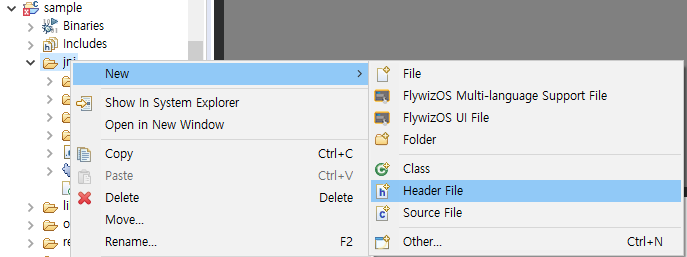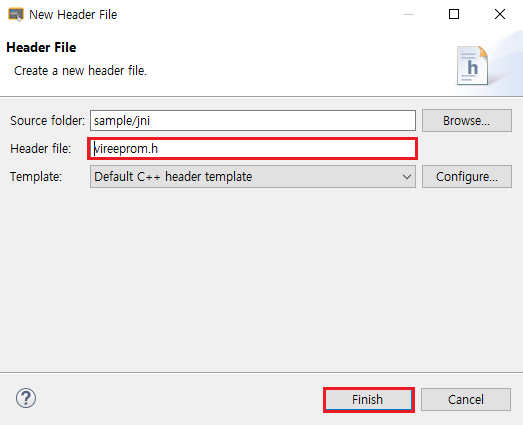Emulate EEPROM function
EEPROM (powered erasable programmable read-write memory) is a user-changeable read-only memory (ROM), which can be erased and reprogrammed (rewritten) by a higher voltage than normal.
Emulation principle
This system is based on Linux, with its own file system and balanced erasing algorithm. Write the saved data to NorFlash (not less than 100,000 erasing times, note that it is not Nandfalsh, NandFlash will be various risks after bad blocks appear). The /data partition is reserved inside FlywizOS for user data. For the convenience of users who are familiar with the operation of the microcontroller, we create a file under the /data partition to emulate an EEPROM space. (The size of the /data partition varies from 1M or several hundred KB, depending on the specific system version)
Scenes to be used
Save data after power off.
Implementation steps
First create a header file in the jni directory of the project.
Select jni under the project, click the right mouse button, select Header File option in the pop-up context menu, and then name it vireeprom.h, and click Finish.

Copy the following code completely into the header file just added. (When the header file was created just now, some content may be automatically added and deleted) These codes realize the emulation function of EEPROM.
#ifndef JNI_VIREEPROM_H_ #define JNI_VIREEPROM_H_ #include <stdio.h> #include <string.h> #include <unistd.h> /** * The storage size of the emulated EEPROM, in bytes, it is recommended not to be too large */ #define EEPROM_SIZE 1024 /** * Actually saved as a file /data/eeprom.eep */ #define EEPROM_FILE "/data/eeprom.eep" class VirEEPROM { public: VirEEPROM() { memset(buff_, 0, sizeof(buff_)); file_ = fopen(EEPROM_FILE, "rb+"); if (file_) { fread(buff_, 1, EEPROM_SIZE, file_); fseek(file_, 0, SEEK_END); int f_size = ftell(file_); //Adjust the file to a suitable size if (f_size != sizeof(buff_)) { ftruncate(fileno(file_), sizeof(buff_)); fseek(file_, 0, SEEK_SET); fwrite(buff_, 1, sizeof(buff_), file_); fflush(file_); sync(); } } else { file_ = fopen(EEPROM_FILE, "wb+"); //Adjust the file to a suitable size ftruncate(fileno(file_), sizeof(buff_)); } } virtual ~VirEEPROM() { if (file_) { fflush(file_); fclose(file_); sync(); } } /** * Return : less than 0 is failure, greater than 0 is the actual number of bytes written * Parameter: The data pointer that value needs to save, which can be a structure pointer, char*, int*..., size is the * size of the data to be saved * Examples of use: * const char buff[]="12345678"; * VIREEPROM->WriteEEPROM(0,buff,sizeof(buff); */ int Write(int addr, const void* value, int size) { if (file_ == NULL) { return -1; } if ((addr >= EEPROM_SIZE) || ((addr + size) > EEPROM_SIZE)) { //Oversize return -2; } memcpy(buff_ + addr, value, size); if (0 != fseek(file_, addr, SEEK_SET)) { return -3; } int n = fwrite((char*)value, 1, size, file_); fflush(file_); sync(); return n; } /** * Return : less than 0 is a failure, greater than 0 is the number of bytes actually read * Parameter: the data pointer to be read by value, which can be a structure pointer, char*, int*..., size is the size of * the data to be read * Examples of use: * char buff[9]; * VIREEPROM->ReadEEPROM(0,buff,sizeof(buff); */ int Read(int addr,void* value,int size) { if (file_ == NULL) { return -1; } if ((addr >= EEPROM_SIZE) || ((addr + size) > EEPROM_SIZE)) { //Oversize return -2; } memcpy(value, buff_ + addr, size); return size; } /** * Return: * 0 Success * Less than 0 failed */ int Erase() { if (file_ == NULL) { return -1; } if (0 != fseek(file_, 0, SEEK_SET)) { return -2; } memset(buff_, 0, sizeof(buff_)); if (sizeof(buff_) != fwrite(buff_, 1, sizeof(buff_), file_)) { return -3; } fflush(file_); sync(); return 0; } static VirEEPROM* getInstance() { static VirEEPROM singleton; return &singleton; } private: unsigned char buff_[EEPROM_SIZE]; FILE* file_; }; #define VIREEPROM VirEEPROM::getInstance() #endif /* JNI_VIREEPROM_H_ */So far, the preparation work has been completed, we will write some examples to test whether it is normal.
Open themainLogic.ccsource file and quote "vireeprom.h" header file at the top of the file.#include "vireeprom.h"Test code
static void onUI_init(){ //The value array, starting from address 0, is written sequentially char value[4] = {1, 2, 3, 4}; VIREEPROM->Write(0, value, sizeof(value)); //Start reading from address 0, read 4 bytes in sequence, and save the read content in buf char buf[4] = {0}; VIREEPROM->Read(0, buf, sizeof(buf)); //Output log LOGD("Data read : %02x, %02x, %02x, %02x", buf[0], buf[1], buf[2], buf[3]); //Clear all eeprom to 0 VIREEPROM->Erase(); }